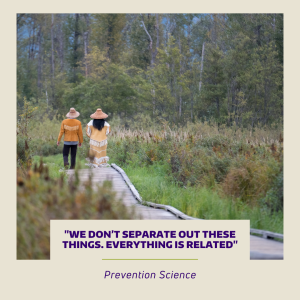“We don’t separate out these things. Everything is related”: Partnerships with Indigenous Communities to Design, Implement, and Evaluate Multilevel Interventions to Reduce Health Disparities
Citation
Rink, E., Stotz, S. A., Johnson-Jennings, M., Huyser, K., Collins, K., Manson, S. M., … & Baldwin, J. (2024). “We don’t separate out these things. Everything is related”: Partnerships with Indigenous Communities to Design, Implement, and Evaluate Multilevel Interventions to Reduce Health Disparities. Prevention Science, 1-12. doi.org/10.1007/s11121-024-01668-9
 This paper focuses on how health programs can better reduce health inequities in Indigenous communities by working at multiple levels—not just with individuals, but with whole communities. These types of programs, called multilevel interventions (MLIs), are well suited for Indigenous communities because of their ability to address these communities’ diverse histories, dynamics, cultures, politics, and environments.
This paper focuses on how health programs can better reduce health inequities in Indigenous communities by working at multiple levels—not just with individuals, but with whole communities. These types of programs, called multilevel interventions (MLIs), are well suited for Indigenous communities because of their ability to address these communities’ diverse histories, dynamics, cultures, politics, and environments.
Rather than focusing only on changing individual behaviors, this approach emphasizes the importance of community involvement and collective well-being. It also highlights that successful programs must be designed and evaluated in partnership with Indigenous communities, respecting their knowledge systems and leadership.
The paper discusses three case studies that address how Indigenous partners collaborated with researchers at every stage of the design, implementation, and evaluation of the multilevel intervention. The authors highlight the following:
- Collaborating with multiple, diverse Tribal partners to carry out multilevel interventions requires iterative, consistent conversations over time;
- Including qualitative and Indigenous research methods in multilevel interventions as a way to honor Indigenous and local knowledge systems as well as a way to understand a health disparity phenomenon in a community; and
- Relationship building, maintenance, and mutual respect among multilevel intervention partners to reconcile past research abuses, prevent extractive research practices, decolonize research processes, and generate co-created knowledge between Indigenous and academic communities.
Overall, the paper emphasizes that long-term, respectful, community-driven partnerships with diverse Indigenous communities are essential for designing health programs that truly meet the needs of Indigenous peoples and help close health gaps.
Abstract

Multilevel interventions (MLIs) are appropriate to reduce health disparities among Indigenous peoples because of their ability to address these communities’ diverse histories, dynamics, cultures, politics, and environments. Intervention science has highlighted the importance of context-sensitive MLIs in Indigenous communities that can prioritize Indigenous and local knowledge systems and emphasize the collective versus the individual. This paradigm shift away from individual-level focus interventions to community-level focus interventions underscores the need for community engagement and diverse partnerships in MLI design, implementation, and evaluation. In this paper, we discuss three case studies addressing how Indigenous partners collaborated with researchers in each stage of the design, implementation, and evaluation of MLIs to reduce health disparities impacting their communities. We highlight the following:
- Collaborations with multiple, diverse tribal partners to carry out MLIs which require iterative, consistent conversations over time;
- Inclusion of qualitative and Indigenous research methods in MLIs as a way to honor Indigenous and local knowledge systems as well as a way to understand a health disparity phenomenon in a community; and
- Relationship building, maintenance, and mutual respect among MLI partners to reconcile past research abuses, prevent extractive research practices, decolonize research processes, and generate co-created knowledge between Indigenous and academic communities.